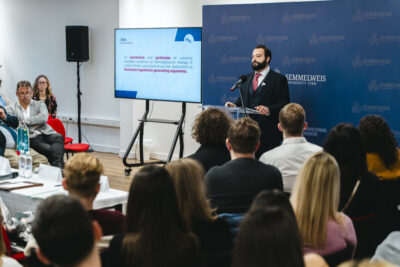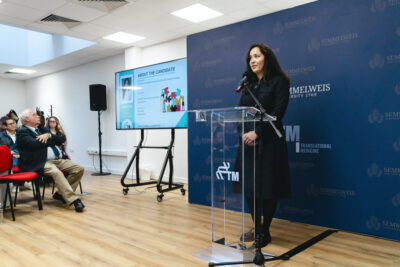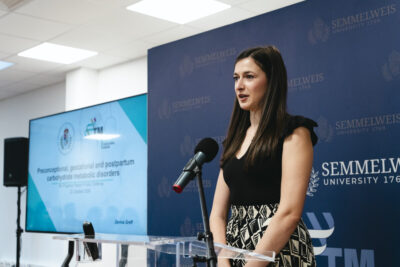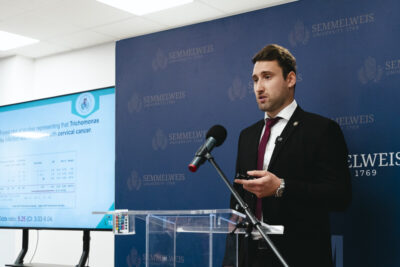Four candidates from the Centre for Translational Medicine defended their Ph.D. theses in October. After they presented their cutting-edge research, which had previously been published in Q1 and D1 journals, the committee members were in complete agreement on the excellence of the students.
At the end of October, four Ph.D. candidates presented their cutting-edge research across various fields. Caner Turan gave a presentation on perioperative management and critical care for patients with liver dysfunction, on which he published articles in two Q1 journals. Through his studies, he made several important recommendations for practitioners and researchers. Dr. Turan generated counter-arguments to previously published studies reporting significant benefits of preoperative glucocorticoid administration in liver surgery.

Boglárka Pethő investigated the role of maternal age in non-chromosomal congenital anomalies in her Ph.D. research. She has published articles on this topic in two D1 journals previously. The outcomes of her study will have a significant impact by enhancing prenatal screening protocols and public health strategies. Healthcare providers can enhance the effectiveness of prenatal care by identifying maternal age groups that are at a higher risk for non-chromosomal anomalies. Public health campaigns might be customized to educate and assist age groups at a higher risk, ultimately decreasing the occurrence and effect of non-chromosomal anomalies.

Dorina Greff researched metabolic disorders during preconception and pregnancy in her Ph.D. thesis. She already has published two articles on this topic in D1 journals. Her research work provides evidence-based recommendations for alternative treatments to metformin in PCOS management and preventive strategies for gestational diabetes. Lowering the burden of these conditions can lead to healthier populations, reduced healthcare costs, and improved societal well-being.

Balázs Hamar‘s Ph.D. thesis was about cervical pathology and health factors. He investigated trichomonas vaginalis as a risk factor for cervical cancer, and the efficacy of Imiquimod in cervical intraepithelial neoplasia. Two articles on these topics were published in Q1 journals. His research on disease-modifying factors in cervical disease has the potential to improve everyday patient care. Additionally, investigating these factors could aid in personalizing therapies and redirecting awareness efforts. The identification of new risk factors for cervical cancer can enhance the vigilance of healthcare policymakers and raise public awareness.

The committee of Caner Turan’s Ph.D. defense was chaired by Professor Andrea Fekete from Semmelweis University, and its members were Dr. Krisztina Hagymási from Semmelweis University and Dr. Lubomir Skladany from the University in Košice Faculty of Medicine. Dr. Vedran Premuzic from the Dialysis Department of KBC Zagreb and Dr. Gabriella Pár from the University of Pécs were present as opponents. The committee of the Ph.D. defense of Boglárka Pethő, Dorina Greff, and Balázs Hamar was also chaired by Professor Andrea Fekete, and the members were Dr. Zoárd Tibor Krasznai from the University of Debrecen and Dr. Kálmán Kovács from the University of Pécs. As opponents, Professor Demetra-Gabriela Socolov from the Universitatea de Medicină și Farmacie „Grigore T. Popa” din Iași and Dr. Nikoletta Nagy from the University of Szeged contributed to the defense.
(Szabó Emese)